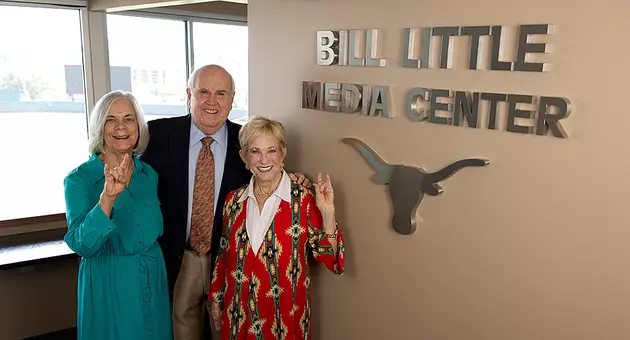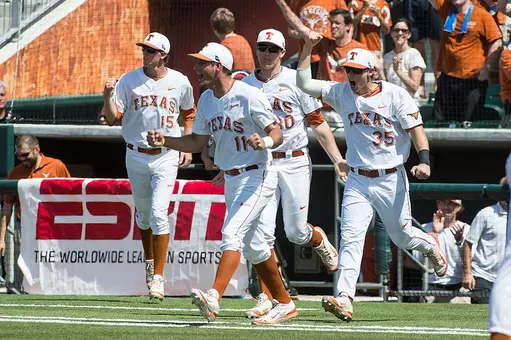The University of Texas at Austin Athletics
Bill Little commentary: Why does sport matter?
07.03.2014 | Bill Little Commentary
It's been 20 years since famed U.S. Representative and UT professor Barbara Jordan spoke out on the importance of sports.
By Bill Little, Texas Media Relations

The occasion was a seminar, sponsored by The University of Texas, on the issues of "Integrity In Athletics," and it came during a blue ribbon panel discussion in the spring of 1994.
The panel, which was made up of professors, writers, sociologists and other noted authorities, stretched all the way across the front of the vast expanse of the stage at the LBJ auditorium. From the back of the room, the red carpet and cushions on the plush seats seemed to almost lap at the base of the white cloth-covered tables, behind which the panelists sat patiently as one after another held court.
The speaker was H. G. Bissinger, a Philadelphia Inquirer reporter who had published a book called "Friday Night Lights" in 1990. To write it, Bissinger had gone to Odessa, and used the Midland-Odessa hotbed of Texas football as the backdrop to his exposé on Texas high school football. The book would later be the genesis for a movie and a television series.
Having grown up in Winters, a small town south of Abilene, I learned a healthy respect for high school football. And in West Texas, high school sports are part of the very fiber at the base of community.
As Bissinger spoke, talking of all of the negatives that come from organized sport and the emphasis on high school football, I couldn't help but think of my youth. I remembered Miss Freddie Gardner, without whose guidance as the girls' basketball coach a lot of my friends would have never learned valuable lessons that extended far beyond the basketball floor. The same was true of W. T. Stapler, who would go on to become a legend in Texas high school football coaching. At the time, he was in his first job, and was just barely older than we were.
I thought of guys whose lives were changed by the advice and the discipline brought by our coaches, not to mention the values etched in all of us by "old-school" methods of stern castigation. It didn't take many wrongs to get the message of how to behave right.
All of that flashed through my mind as Bissinger went on about the problems in organized sports, and of the excesses he thought he saw during his visit to a cradle of Texas high school football.
No one, it seemed, was moved to challenge his premise.
And then suddenly, it all changed.
As the audience faced the panel, Bissinger was seated far to the right. From the other end of the table, as Bissinger was almost in mid-sentence, a familiar voice boomed.
Barbara Jordan had heard enough.
"Why does sport matter so much?" she boomed defiantly in what surely could have been best described as "the voice of God."
Her love of sport and faith in young people transcended politics, race, and gender. And as Bissinger was speaking on the things wrong with amateur sports as we know them, he was treading on the fighting side of the famed former U.S. Representative who was teaching at UT's LBJ School of Public Affairs.
"Why does sport matter so much?" she repeated.
"It matters because sport is vital, it is viable, it is basic, and it is essential. Sport is not a frivolous distraction, as one may first, without thinking, believe. Sport is an equal opportunity teacher. It is a nonpartisan event. It is universal in its application."
At the other end of the table, Bissinger was slumping, almost out of sight.
"I see sport as an antidote to some of the balkanization that we see occurring in our society; everybody wanting their own private little piece of turf; an absolute abandonment of any sense of common purpose, of common good," Jordan continued. "It is almost a cliché to say there is no 'I' in the word 'team.' If you are so focused on self, you cannot have any awareness of the common good."
A hush grew over the auditorium, as the audience, made up of students and professors who were leaning toward agreeing with Bissinger, hung on every word.
"Another reason why I believe sport is essential is self-esteem," she said. "In order to be a contributor to American life, each individual needs to have a high regard for himself or herself first. Sport can do that. If you get out there and you have never been recognized for anything before in your life, if you show some capability, some particular tilt and talent for a sport, it gives you self-esteem."
Heads began to nod, and every speaker on the panel turned in their chairs to listen and view an American legend. That is, except for Bissinger, who by now was so far down in his chair you could barely see him.
"I believe that sport can teach lessons in ethics and values for our society. It is attractive to the young, and how many times have we heard someone despair over the plight of our young people?" she said. "If you give them something to engage their energies, you would see that it might be something which lures them into the community of mankind and womankind."
It was several seconds of almost stunned silence before the applause began, a tribute to the lady who cared so much about kids, and to the power of her words.
That was in 1994, and over twenty years later they still play football at Odessa Permian High School, where a community embraces young people of all races, where that fiber of Texas football is obvious.
It is the same fiber that weaves its way through the small towns and cities of Texas, on a Friday night or a Thursday night or a Saturday afternoon, when the sense of community transcends a win or a loss.
It is part of the coming of age in the state, and it expands its message far beyond football to all of the other sports where lessons are learned, and values are taught.
Generations have continued to understand that. Sayings that have sometimes been treated as clichés still carry the message.
Barbara Jordan understood that, and she remained a steadfast supporter of women's athletics at Texas until her passing in 1996. She saw that whether it was something played on a football field or in an arena, with a stick and a ball or a piece of dreams, sport itself teaches us a lot about life.
And in an auditorium years ago, midst writers and teachers and philosophers, Barbara Jordan gave us a great gift—a transcending thought about not only what is, but what can be.






